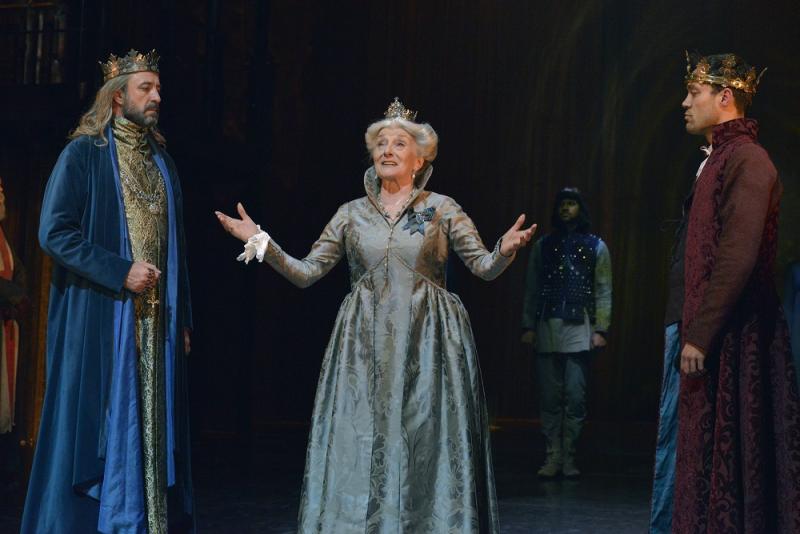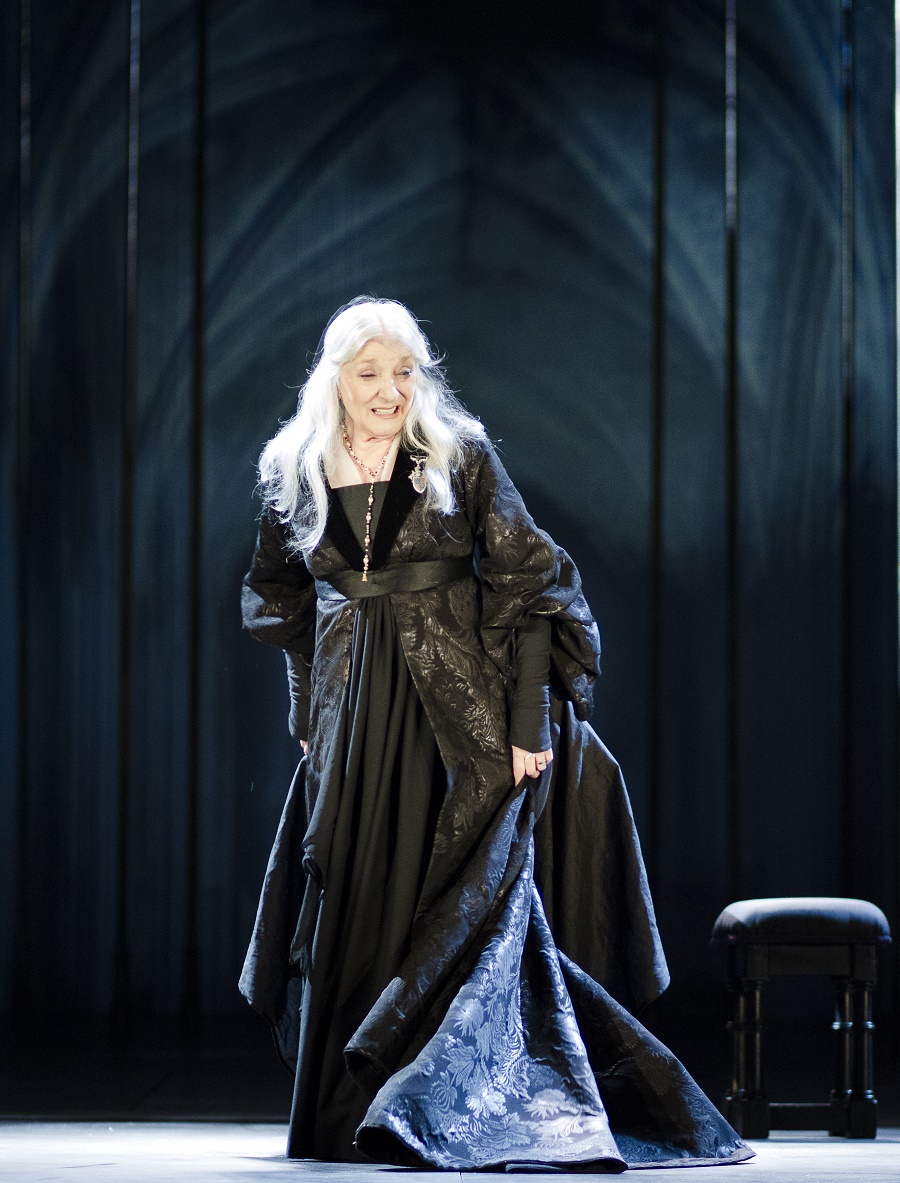10 Questions for Actress Jane Lapotaire | reviews, news & interviews
10 Questions for Actress Jane Lapotaire
10 Questions for Actress Jane Lapotaire
Veteran actress on returning to the stage in the RSC Histories

Jane Lapotaire's distinguished career on stage and screen was cut short in 2000 when she collapsed in Paris with a massive brain haemorrhage. She was giving a Shakespeare masterclass at the time and now, 15 years later, at the age of 70, she is once again acting on stage in Shakespeare.
She made the return to theatre in 2013 with an emotionally charged account of a small role, the mourning Duchess of Gloucester in the RSC's Richard II, starring David Tennant. As Greg Doran adds Henry V to his cycle of Histories – Henry IV, parts 1 and 2, were unveiled last year – she is relishing the role of Queen Isobel of France as well. And in the meantime she appeared ("blink and you miss me") as Princess Irina in the star-spangled 2014 Downton Abbey Christmas special.
Lapotaire's earlier career included leading roles for both the National Theatre, from its earliest days under Laurence Olivier at the Old Vic, and the RSC. There she was especially memorable in the title role of Piaf in Pam Gems' play about the diminutive French warbler. In 1981 she won a Tony (despite competition from Elizabeth Taylor in The Little Foxes) when the production transferred to Broadway. Her many screen roles included a famous Marie Curie on television in 1977. She is the author of three books, two volumes of memoir and Time Out of Mind, about her experience of illness. She was married to the filmmaker Roland Joffe. Her son, Rowan Joffe, also a film-maker, lives in Los Angeles. She talks to theartsdesk.
HEATHER NEILL: You are clearly very happy and excited to be back on stage. You've worked with Greg Doran before, haven't you?
JANE LAPOTAIRE: I'm back home, where I belong! And not just at the RSC but with Greg! He's the best artistic director the RSC has ever had. I did Katharine of Aragon for him in Henry VIII. He's honest, treats everybody equally and he's been an actor so his notes are very pertinent and his sensibilities very acute. Greg has given me my life back.
Did you always want to act?
I once wanted to be a journalist, but I got the theatre bug and that was it. I did write for the Glasgow Herald, though – articles on whatever I wanted – and I wrote about South Africa for the Guardian. And my book Time Out of Mind was shortlisted for the MIND award; Hilary Mantel won. I went straight to the Bristol Old Vic Theatre School from grammar school and it was like going to heaven. I happened to be born in Ipswich. I was half French and illegitimate and in 1944 there was a terrible stigma about that so I never felt I belonged. Audiences made up for my lack of parents to begin with. Not so much now! Being a classical actor is a vocation – you don't do it to be famous or get rich. You do it because you love the language.
How does the brain injury affect your everyday life?
I've been miraculously lucky. I've got a titanium clip in my brain, which keeps me alive, and I have medication that would sink a small rowing-boat – I always say I'm going on my drug run when I go off to the doctor's! Stamina is a problem. When a brain-injured person says they're tired it's the equivalent of having pneumonia compared with most people's experience of a cold. And I'm allergic to just about everything – dust, dairy, flour, paper mites, those scented things that hang in taxis... It's a battle physically. I feel all my aches and I have an allergy filter in the dressing-room, but then Dr Theatre kicks in and it's all forgotten!
 And what about on stage? Do you have a problem learning lines?
And what about on stage? Do you have a problem learning lines?
None at all. My memory isn't affected; the problem is in the spatial relationship area. A very sweet ASM catches me in the wings when I come off – going from light to dark is really hard and some of the ramps on to the stage have a rather steep incline, so she helps me with that too. Balance is my problem. (Pictured right: Lapotaire in Richard II.)
You did quite a bit of research when you played the Duchess of Gloucester. What about Queen Isobel?
I can't do anything about this role because they gave Isobel of Bavaria a very bad press in her day. Her husband, King Charles VI was insane, but Shakespeare doesn't write that, although he does write through a bias about the French. But she's a unique voice in the play. She talks of peace! It's very unusual in a play about war.
In Richard II your part comes immediately after a funeral and in Henry V it's before a marriage.
Yes – and I open and close the cycle!
Will you be touring with the company?
I'm not going to China – my brain can't cope with the 11-hour flight – but I'm going to New York.
You have to wait a long time before your entrance in Act Five of Henry V. How do you fill the time?
I draw. I can't read because I listen to the play every night: I need to know how the play is going. I need to know what atmosphere I'm coming into. And I crochet. I made about nine beanie hats for the Richard II cast, matching ones for David Tennant and his little boy, but I put a white pom-pom on that one. I don't start getting ready until the interval – I draw, crochet and look at the swans on the Avon. I'm in Room 101, but I'm not taking it personally!
You were in Peter Brook's famous production of Oedipus at the Old Vic, the one with the gilded phallus. What was that like?
I was absolutely terrified! I used to hope I'd fall down a manhole before I got to the theatre. All the women were frightened of Peter Brook. He's mellowed quite a bit now. He asked me to join the cast of Mahabharata but I thought no, I don't want to be blindfolded and subservient to the king – for nine hours! It was wonderful, though. But I took six months off about that time to be with Rowan who was doing his A levels.
Do you still teach Shakespeare?
Yes, in this country and in St Louis I teach John Barton's method: if only young actors would play the antitheses – the words that complement or contrast or contradict each other – 80 per cent of the text would come alive. It can be like a one-woman show, but the older you get, the more tricks you learn: I let them do the talking!
You are playing with some young actors in Henry V.
Alex Hassell is a very talented young man. And very dishy. And, no, I'm not a cougar; my partner is 81 years old!
- Henry V is at the Royal Shakespeare Theatre in Stratford-upon-Avon until 25 October, then at the Barbican from 7 November to 30 December
Explore topics
Share this article
The future of Arts Journalism
You can stop theartsdesk.com closing!
We urgently need financing to survive. Our fundraising drive has thus far raised £49,000 but we need to reach £100,000 or we will be forced to close. Please contribute here: https://gofund.me/c3f6033d
And if you can forward this information to anyone who might assist, we’d be grateful.

Subscribe to theartsdesk.com
Thank you for continuing to read our work on theartsdesk.com. For unlimited access to every article in its entirety, including our archive of more than 15,000 pieces, we're asking for £5 per month or £40 per year. We feel it's a very good deal, and hope you do too.
To take a subscription now simply click here.
And if you're looking for that extra gift for a friend or family member, why not treat them to a theartsdesk.com gift subscription?
more Theatre
 50 First Dates: The Musical, The Other Palace review - romcom turned musical
Date movie about repeating dates inspires date musical
50 First Dates: The Musical, The Other Palace review - romcom turned musical
Date movie about repeating dates inspires date musical
 Bacchae, National Theatre review - cheeky, uneven version of Euripides' tragedy
Indhu Rubasingham's tenure gets off to a bold, comic start
Bacchae, National Theatre review - cheeky, uneven version of Euripides' tragedy
Indhu Rubasingham's tenure gets off to a bold, comic start
 The Harder They Come, Stratford East review - still packs a punch, half a century on
Natey Jones and Madeline Charlemagne lead a perfectly realised adaptation of the seminal movie
The Harder They Come, Stratford East review - still packs a punch, half a century on
Natey Jones and Madeline Charlemagne lead a perfectly realised adaptation of the seminal movie
 The Weir, Harold Pinter Theatre review - evasive fantasy, bleak truth and possible community
Three outstanding performances in Conor McPherson’s atmospheric five-hander
The Weir, Harold Pinter Theatre review - evasive fantasy, bleak truth and possible community
Three outstanding performances in Conor McPherson’s atmospheric five-hander
 Dracula, Lyric Hammersmith review - hit-and-miss recasting of the familiar story as feminist diatribe
Morgan Lloyd Malcolm's version puts Mina Harkness centre-stage
Dracula, Lyric Hammersmith review - hit-and-miss recasting of the familiar story as feminist diatribe
Morgan Lloyd Malcolm's version puts Mina Harkness centre-stage
 Reunion, Kiln Theatre review - a stormy night in every sense
Beautifully acted, but desperately grim drama
Reunion, Kiln Theatre review - a stormy night in every sense
Beautifully acted, but desperately grim drama
 The Code, Southwark Playhouse Elephant review - superbly cast, resonant play about the price of fame in Hollywood
Tracie Bennett is outstanding as a ribald, riotous Tallulah Bankhead
The Code, Southwark Playhouse Elephant review - superbly cast, resonant play about the price of fame in Hollywood
Tracie Bennett is outstanding as a ribald, riotous Tallulah Bankhead
 The Lady from the Sea, Bridge Theatre review - flashes of brilliance
Simon Stone refashions Ibsen in his own high-octane image
The Lady from the Sea, Bridge Theatre review - flashes of brilliance
Simon Stone refashions Ibsen in his own high-octane image
 Romans: A Novel, Almeida Theatre review - a uniquely extraordinary work
Alice Birch’s wildly epic family drama is both mind-blowing and exasperating
Romans: A Novel, Almeida Theatre review - a uniquely extraordinary work
Alice Birch’s wildly epic family drama is both mind-blowing and exasperating
 The Producers, Garrick Theatre review - Ve haf vays of making you laugh
You probably know what's coming, but it's such great fun!
The Producers, Garrick Theatre review - Ve haf vays of making you laugh
You probably know what's coming, but it's such great fun!

Add comment